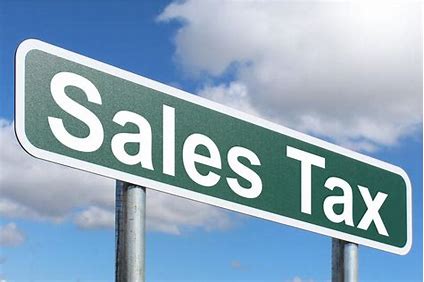Are you collecting Sales Tax?
Do you sell things on Amazon or eBay?
Well, if you are selling online you just got hired as a tax collector!
A sales tax collector is anyone who sells products which are subject to state tax, and is required to collect taxes from their customers in that state. You are required to charge the applicable sales tax if you sell items online–but only if your customers are in a state which imposes sales tax. Charging sales tax means you have become a tax collector. The term “sales tax” is used to describe a tax imposed on the purchase of goods and services. This tax is typically for the customer, but businesses can also be taxed on their sales of goods and services. Who knew? Well, I sure did, and I’m here to tell you more. So, get comfortable and read on!
A shopper in a brick-and-mortar store is familiar with sales tax, but online shoppers have a different experience; and this is where things get complicated. Have you ever purchased on Amazon and paid sales tax one week but not the next? Why is that? One explanation is that it all depends on the tax code of the state. In New Jersey, for instance, a tax is not imposed on the sale of clothes, but is imposed on the sale of other material purchases. There are also different requirements for who pays the tax. The customer is responsible for paying sales tax on items purchased, while the business owner should have a sales tax exemption certificate for purchasing inventory. This sales tax is the reason why, as a business owner, you have two jobs: salesman and tax collector.
Did you know you got hired as a tax collector when you started selling online? The thing about selling online at popular sites like amazon.com, ebay.com, and etsy.com is that sales occur in all fifty states. This results in Nexus.
What is Nexus?
Nexus is the physical presence in a state other than your home state. Nexus is important for determining if you must act as a tax collector or a taxpayer for another state when you sell things online. You could say this is the jurisdiction for taxes.
Nexus means a connection between a state and business.
To minimize the tax for doing business in many states, the federal government passed Public Law 86-272, which prevents a state from taxing entities conducting business outside of their home state, and ensures that these entities meet the state’s strict requirements. To illustrate, a sales tax is not imposed on advertising the sales of personal property. The same goes for online retailers; they are protected while conducting business from a home office, and purchasing from manufacturers. A business can still be required to pay a minimum tax or a base tax in states like Ohio, Texas, Washington, Alabama, California, Georgia, Massachusetts, New Hampshire, New Jersey, and North Carolina. Penalties and interest will be added to your tax due if left unpaid, and not knowing is not an excuse to forgo paying your taxes. So, you have nexus, and then you have sales tax nexus.
Sales Tax Nexus means having a physical presence, inventory or independent contractor in that state gives you a presence in that state. The Minimis Standard is the Slightest Presence a seller has, and determining Physical Presence is now under attack by Cookie Monster! Well, there is no real monster involved, but there is a target aimed at online sellers. The law is going to use the cookies from a company’s website to determine that company’s presence. What does this mean for you? Many States now have an Amazon Law to impose nexus, because they collect a portion of their revenue from sales tax. This affects many companies whose platform is an online marketplace. The Marketplace Fairness Act protects remote sale up to $1million annually. And that’s good news for you! One great court case that is impacting sales tax nexus is Quill vs. North Dakota (1992), where a seller’s physical presence is required for nexus to be established.
These are the basics, but any expert will tell you there’s a lot more to it. So, let me tell you a few more things. Sales taxes are due quarterly and a late filing results in a fee. You are required to file once you have a sales tax authority certificate, even if you have no sales.
You may be an amazing salesperson, but it seems like you have to be a tax expert as well. Did you sign up for that? No, of course not! What you signed up for is selling online–not being a tax expert. Not to worry–that’s my job. I’m here to make the business of taxes easy and simple. Now, this is something worth signing up for: professional sales tax service and friendly assistance.
Are you ready to protect yourself from surprise sales taxes? If you are, then contact me for my services today–and subscribe for free!


Leave a Reply